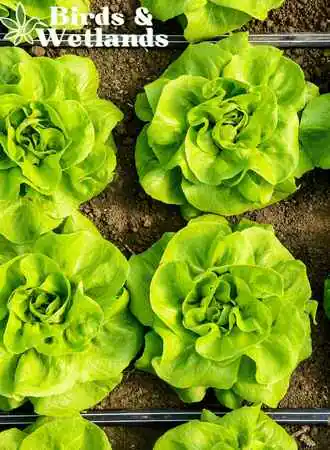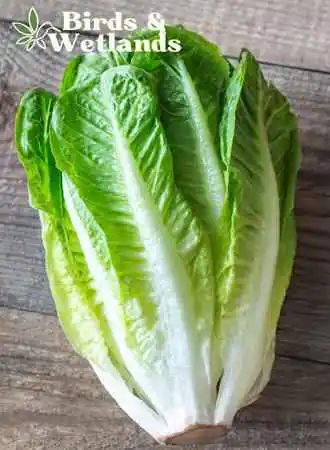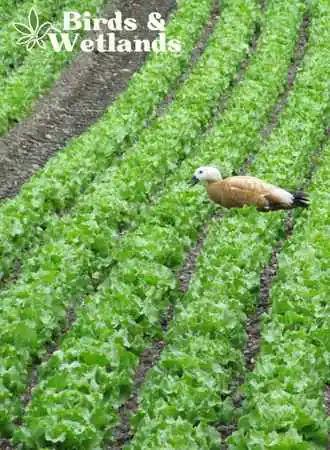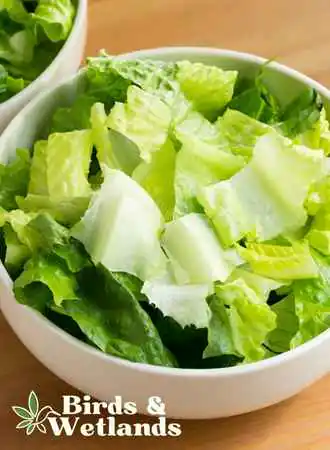Are you wondering if your feathered friends can enjoy some of your leafy greens? Let’s find out!
Lettuce is a popular choice, but can ducks eat lettuce?
Yes, ducks can eat lettuce as it is a safe and nutritious food option. Lettuce provides ducks with essential vitamins, minerals, and fibre, which can contribute to their overall health. When offering lettuce to ducks, wash it thoroughly and tear it into small, manageable pieces for easier consumption.
Key Takeaways on Can Ducks Eat Lettuce
- Ducks can safely eat lettuce in moderation, but it should not be their primary source of food.
- Lettuce can provide some nutritional benefits to ducks, such as vitamins and fiber, but it should not replace their regular duck feed.
- Make sure to thoroughly wash and chop the lettuce before feeding it to your ducks.
- It’s also important to monitor how much lettuce you give to your ducks to avoid overfeeding or causing digestive issues.
Is lettuce good for ducks?
Yes, lettuce is good for ducks. Here are the health benefits of lettuce for your beloved pets:

Vitamin A
Lettuce contains beta-carotene, which the body converts into vitamin A. Vitamin A is important for ducks because it helps maintain healthy skin. It also helps with eyesight, as it helps to keep the cornea (the clear front part of the eye) moist, which can help to prevent eye infections.
Vitamin A helps to protect the body from infections and diseases. Without enough vitamin A, ducks may be more prone to illness.
Vitamin K
Lettuce is a good source of vitamin K, which is important for proper blood clotting. When a duck is injured, vitamin K helps to stop the bleeding by activating proteins that help to form clots.
Vitamin K is also important for bone health, as it helps to keep bones strong and reduce the risk of fractures. Without enough vitamin K, ducks may be more prone to bleeding and will have weaker bones.
Folate
Folate, also known as vitamin B9, is an essential nutrient that plays a crucial role in a duck’s overall health and well-being. It is necessary for the proper development and function of the duck’s cells, and it helps to convert food into energy.
Adequate intake of folate is also important for the proper functioning of the duck’s immune system and for synthesizing DNA and RNA.
A folate deficiency can lead to various health problems in ducks, including anemia, weight loss, and reduced immune function.
Iron
Lettuce contains small amounts of iron, which is important for producing red blood cells. Red blood cells have a protein called hemoglobin, which carries oxygen from the lungs to the rest of the body.
Without enough iron, ducks may experience health issues and have a harder time producing enough red blood cells, leading to anemia. Iron is also important for transporting oxygen throughout the body, as it helps keep the body’s tissues and organs functioning properly.
Calcium
Calcium is also present in lettuce. It is an important nutrient for bone health. It helps keep bones strong and helps to reduce the risk of fractures. It is also important for the proper functioning of muscles and nerves.
Without enough calcium, ducks may have weaker bones and be more prone to fractures. Calcium deficiency in egg-laying ducks can lead to thin-shelled eggs or soft-shelled eggs.
Vitamin C
Vitamin C, also known as ascorbic acid, is an essential nutrient important for ducks’ health and well-being. It plays a role in synthesizing collagen, a protein important for the structure and function of skin, blood vessels, and other connective tissues.
Vitamin C is also a powerful antioxidant, which helps protect cells from damage caused by free radicals. In ducks, vitamin C is important for properly functioning the immune system and for forming healthy skin, feathers, and beaks.
What kind of lettuce can ducks eat?
Only a few kinds of lettuce are suitable for feeding ducks. Ducks can eat romaine and iceberg lettuce, but the former is healthier.
Romaine is a better choice for ducks than iceberg lettuce because it has higher levels of nutrients. It has more vitamins, minerals, and fiber and is a good source of vitamins A and K, folate, phosphorus, potassium, and magnesium.
Romaine also has more calcium and a wider variety of antioxidants like lutein and zeaxanthin, which can help protect the body from environmental damage.
The fiber in romaine helps with duck digestion and supports gut health, which can be important for maintaining a healthy weight and properly processing food.
Romaine also has essential fatty acids for overall health, including brain function, heart health, and the immune system.
Iceberg lettuce has low nutritional value but can be fed to ducks as an occasional treat if romaine isn’t available.
For these reasons, it is recommended to feed wild ducks romaine lettuce over iceberg lettuce to ensure they receive the nutrients and hydration they need.

Can baby ducks eat lettuce?
Yes, you can feed young ducks lettuce and other vegetables, for that matter. Eating lettuce and leafy vegetables provides them with nutritious benefits.
Lettuce in a young duck’s diet provides it with essential vitamins and minerals, such as vitamins A and E, calcium, and iron. It also contains dietary fiber that helps to regulate digestion and healthy bacteria production in the gut.
The leafy greens are high in water content, which aids in hydration since ducks need plenty of water to help keep their feathers soft and waterproof.

How much lettuce can ducks eat?
Ducks love munching on lettuce, with some species particularly fond of the green leafy vegetable. While there is no limit to how much lettuce a duck can eat, it can’t provide all the nutrients it needs to stay healthy. So, it is still important for owners to practice the feed-in-moderation rule and provide their flock with a well-balanced diet that includes other food items.

How to serve lettuce to ducks
Lettuce is a flexible, healthy treat that duck owners can mix with other vegetables and fruits. Here’s how to serve lettuce to ducks:
- Chop lettuce into small pieces so that ducks can have eat and digest them easily.
- Feed lettuce to your backyard ducks with grains, other vegetables and most leafy greens such as Brussels sprouts, Swiss chard, rolled oats, cut grass and pea shoots.
- You can also mix lettuce with root vegetables. But avoid feeding ducks white potatoes which are members of the nightshade family.
- To create healthy treats, mix lettuce with fresh veggies and regular duck food from pet stores.
- Stop feeding ducks large quantities of citrus fruits, which can cause acid reflux and stomach pain. Instead, feed your ducks with a mix of lettuce, papaya or banana.

Similar Foods for Ducks
| Asparagus | Can Ducks Dine on Asparagus? |
| Beets | Are Beets Good for Ducks? |
| Brussel Sprouts | Feeding Ducks Brussel Sprouts |
| Cabbage | Can Ducks Munch on Cabbage? |
| Cauliflower | Is Cauliflower Safe for Ducks? |
| Cucumber | Refreshing Cucumber for Ducks |
| Grass | Ducks Eating Grass: Is It Safe? |
| Lettuce | Leafy Greens for Ducks |
| Onions | Can Ducks Eat Onions? |
| Peppers | Feeding Ducks Peppers |
| Spinach | Can Ducks Enjoy Spinach? |
| Squash | Squash: A Healthy Treat for Ducks |
| Sweet Potatoes | Are Sweet Potatoes Good for Ducks? |
Best Duck Feed Pellets
Are you a duck owner looking for the perfect feed to keep your feathered friends happy and healthy? Look no further than Purina Duck Feed Pellets! With their nutritionally balanced formula and high-quality ingredients, these pellets are the ultimate solution for providing your ducks with the nutrition they need to thrive.
Pros
- Complete Nutrition: Purina Duck Feed Pellets are nutritionally balanced to provide all the essential vitamins and minerals that ducks need to stay healthy and strong.
- Easy to Digest: The pellets are specially formulated to be easy to digest, which makes them ideal for ducks of all ages.
- Promotes Growth and Development: With its balanced nutrition formula, Purina Duck Feed Pellets are designed to support healthy growth and development in ducks.
- Suitable for All Breeds: Whether you have domestic ducks or wild ducks, Purina Duck Feed Pellets are suitable for all breeds of ducks.
- Trusted Quality: Purina has been producing high-quality animal feed for over 100 years, so you can trust that your ducks are getting the best possible nutrition with Purina Duck Feed Pellets.
Cons
- Cost: Compared to other types of duck feed on the market, Purina Duck Feed Pellets can be slightly more expensive. However, many customers feel that the high-quality ingredients and balanced nutrition formula are worth the extra investment.
- Pellet Size: Some customers have noted that the pellet size of Purina Duck Feed Pellets can be quite large, which may not be suitable for smaller or younger ducks. However, many customers have reported that the pellets can easily be broken up or soaked in water to make them easier to eat.


